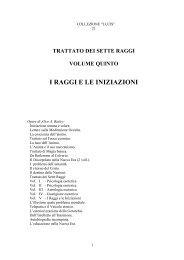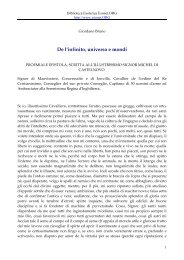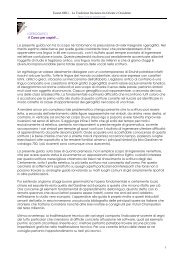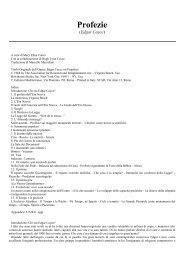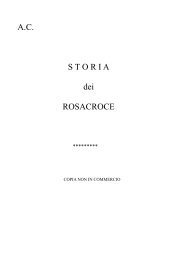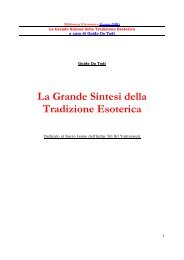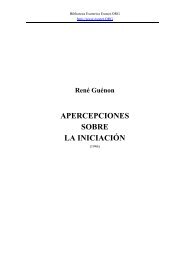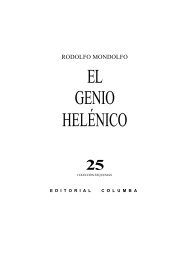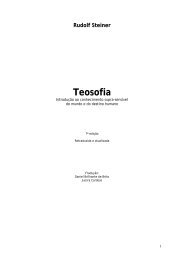Biblioteca Esoterica Esonet.ORG http://www.esonet.ORG 1
Biblioteca Esoterica Esonet.ORG http://www.esonet.ORG 1
Biblioteca Esoterica Esonet.ORG http://www.esonet.ORG 1
You also want an ePaper? Increase the reach of your titles
YUMPU automatically turns print PDFs into web optimized ePapers that Google loves.
CHAPTER FOURTEEN<br />
Rites of Passage - 1<br />
<strong>Biblioteca</strong> <strong>Esoterica</strong> <strong>Esonet</strong>.<strong>ORG</strong><br />
<strong>http</strong>://<strong>www</strong>.<strong>esonet</strong>.<strong>ORG</strong><br />
Whatever occurs at the level of personhood and culture is deeply affected by functional<br />
processes and changes in the individual's biological organism. Thus, movement from one<br />
sublevel to another in the socio-cultural system in which a child is born normally is related<br />
to the factor of age, particularly to biopsychic periods of transformation such as puberty,<br />
change of life (or menopause), and the progressive deterioration of biological functions in<br />
old age. A person also experiences sociocultural transitions from narrower to more<br />
inclusive areas of interpersonal relationship if he or she moves from a village to a city,<br />
from a parental home to a university, or sooner or later shifts his or her sense of<br />
involvement and concern from a family group to a nationwide business or governmental<br />
organization or even to international issues and the future of mankind under the menace<br />
of a nuclear holocaust.<br />
Unless precipitated by unpredictable catastrophes, all basic changes — be they<br />
biological, biopsychic, sociocultural, or even more far reaching — require a period of<br />
transition. If a critical event, decision, or move precipitates the change, a brief or long<br />
period of conscious or semiconscious preparation for or expectation of the actual<br />
occurrence nearly always precedes it, and the latter is followed by a time of readjustment.<br />
If the change is radical enough — if it affects the very roots of the being and the<br />
framework of consciousness — it is a crisis. A crisis (from the Greek krino, to decide) is<br />
essentially a series of internal or external occurrences that forces a person to take a<br />
decision or (negatively) compels him or her (more or less unwillingly) to alter his or her<br />
way of feeling, thinking, and/or behaving. The alteration may affect relationships with<br />
other people, the environment, and/or society as a whole; or it may manifest as an inner<br />
transformation, a new perspective on life and the universe, a deep new feeling of what is<br />
valuable and "real."<br />
In many ancient societies, a great deal of attention was paid to periods of biological<br />
and psychosocial changes resulting in a new type of relationship between the person<br />
experiencing the transformation and his or her community. "Rites of passage" were<br />
devised to accomplish definite purposes. Modern individualistic and materialistic societies<br />
usually fail to understand and appreciate these purposes and rites, and this failure has<br />
serious, negative ramifications in the psychological and sociocultural development of a<br />
personality. This does not mean that rites of passage or ritualistic processes are absent<br />
from Euro-American society; many sociocultural processes (especially in education,<br />
business, and politics) are de facto ritualistic. However, the element of "sacredness" is<br />
absent from them. If it is present theoretically, as in Catholic sacraments, most of the<br />
people performing the rites only superficially realize the essential meaning and vital<br />
challenges the rites were meant to convey to those experiencing them.<br />
According to the Catholic tradition (which sadly is being diluted today), a sacrament<br />
has two aspects. It is a symbol of the progressive participation of a person in the<br />
community of the Church; and it theoretically establishes, actually and psychically (or<br />
spiritually from the Church's point of view), a two-way relationship between the person<br />
158



